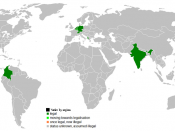Euthanasia.
Microsoft Encarta describes Euthanasia, also known as mercy killing, as the practice of ending a life so as to release an individual from an incurable disease or intolerable suffering.
There are three different types of Euthanasia; Voluntary, Passive (or negative) and Active (or positive)
Voluntary euthanasia involves a request by the dying patient or that person's legal representative.
Passive or negative euthanasia involves not doing something to prevent death--that is, allowing someone to die;
Active or positive euthanasia involves taking deliberate action to cause a death.
Euthanasia has been accepted both legally and morally in various forms in many societies. In ancient Greece and Rome it was permissible in some situations to help others die. Both Socrates and Plato sanctioned forms of euthanasia in certain cases. Voluntary euthanasia for the elderly was an approved custom in several ancient societies.
With the rise of organized religion, euthanasia became morally and ethically abhorrent.
Christianity, Judaism, and Islam all hold human life sacred and condemn euthanasia in any form.
Following traditional religious principles, Western laws have generally considered the act of helping someone to die a form of homicide subject to legal sanctions. Even a passive withholding of help to prevent death has frequently been severely punished. Euthanasia, however, occurs secretly in all societies, including those in which it is held to be immoral and illegal.
Organizations supporting the legalization of voluntary euthanasia were established in Great Britain in 1935 and in the United States in 1938. They have gained some public support, but so far they have been unable to achieve their goal in either nation. In the last few decades, Western laws against passive and voluntary euthanasia have slowly been eased, although serious moral and legal questions still exist.
The National Conference of Commissioners on Uniform State Laws in 1985...


